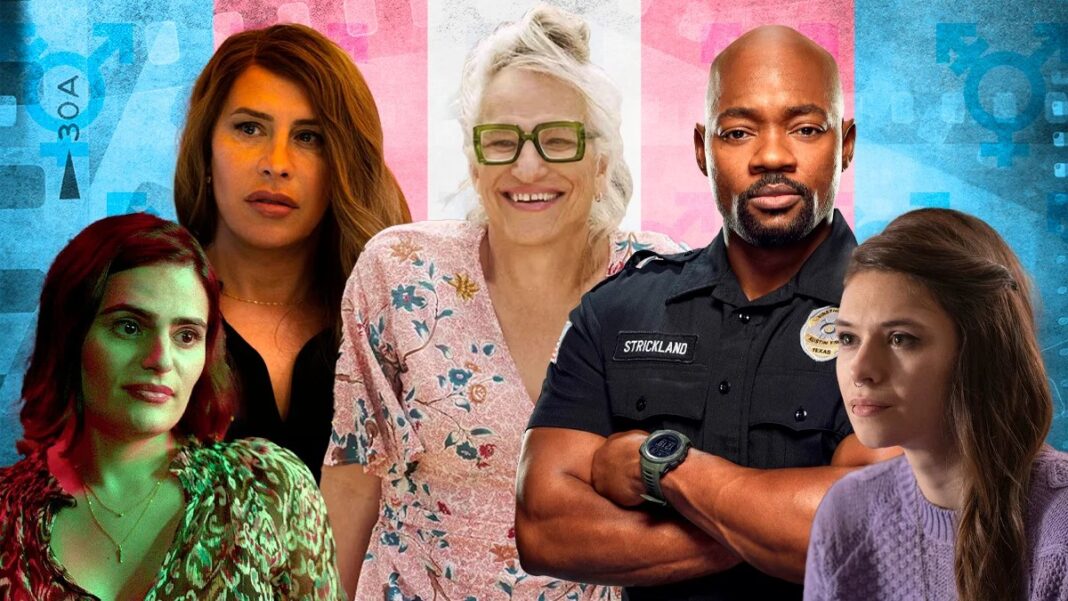Introduction
The landscape of representation and support for the transgender community in Hollywood seems to be shifting dramatically. With the recent political climate influencing media narratives, the question arises: What does this mean for the future of trans representation in film and television? This article dives deep into the implications of anti-trans rhetoric in the political arena and its subsequent effects on major media companies.
Full Review
Following the recent election, the political strategies employed by candidates have reverberated throughout various sectors, including entertainment. Notably, Donald Trump’s campaign invested a staggering $215 million promoting ads that criticized Kamala Harris for her advocacy of trans rights. This aggressive campaign has sparked discussions about the potential backlash against trans representation in Hollywood.
The ramifications of this political maneuvering are becoming evident as two major media companies have made decisions that suggest a retreat from supporting trans issues. One of the most alarming developments was Disney’s decision to pull a trans-centric episode of the animated series “Moon Girl and Devil Dinosaur.” The news sent shockwaves through the animation community, where many artists and advocates expressed their disappointment and concern about the message this sends regarding inclusivity.
Furthermore, HBO’s recent endorsement of J.K. Rowling—who has been vocal in her opposition to transgender rights—has raised eyebrows across the industry. Rowling, known for her role as an executive producer on the upcoming “Harry Potter” TV series, has become a polarizing figure. HBO’s support for her has left many questioning the network’s commitment to diversity and inclusion, especially in a time when representation matters more than ever.
Together, these actions highlight a troubling trend where corporate decisions may be swayed by external political pressures, potentially sidelining the voices and stories of marginalized communities. The entertainment industry has long been a platform for progressive ideas, and this apparent regression raises concerns about the future of inclusive storytelling.
As fans and advocates of trans rights continue to push for visibility and representation in media, it becomes crucial to scrutinize the choices made by major networks and studios. The impact on the creative landscape, particularly in animation and fantasy genres that traditionally embrace diversity, cannot be understated.
The question remains—how will these corporate decisions affect the artists, creators, and audiences who believe in the importance of representation? As we look toward the future, it is essential to advocate for inclusive narratives that reflect the diversity of human experiences.
Conclusion
In summary, the recent developments surrounding anti-trans rhetoric and its influence on Hollywood are concerning. As major media companies like Disney and HBO make choices that seem to prioritize political safety over progressive values, the future of trans representation hangs in the balance. It is vital for audiences to remain vigilant and advocate for inclusive storytelling that celebrates diversity rather than shying away from it. The fight for visibility and representation is far from over, and every voice matters in this ongoing dialogue.
FAQs
1. What is anti-trans rhetoric, and how does it affect the media?
Anti-trans rhetoric refers to negative discourse that undermines the rights and identities of transgender individuals. In media, such rhetoric can lead to reduced representation and support for trans stories, affecting how these communities are portrayed.
2. Why did Disney decide to pull the “Moon Girl and Devil Dinosaur” episode?
Disney’s decision to shelve a trans-centric episode appears to be influenced by a desire to avoid backlash in a politically charged environment. This raises questions about the company’s commitment to inclusivity and representation.
3. How has J.K. Rowling’s stance impacted her involvement in the “Harry Potter” series?
J.K. Rowling’s vocal opposition to trans rights has polarized audiences. Her role as an executive producer on the upcoming “Harry Potter” series has drawn criticism, particularly from those advocating for trans rights in media.
4. What implications do these corporate decisions have for trans representation in Hollywood?
Corporate decisions that lean towards anti-trans sentiments can hinder the progress made in representation. This can lead to fewer opportunities for trans narratives and voices in mainstream media.
5. How can audiences advocate for better representation?
Audiences can advocate for better representation by supporting media that features diverse stories, voicing their concerns to networks, and engaging in conversations that highlight the importance of inclusion.
6. Are there any upcoming shows or movies that support trans representation?
Yes, there are various shows and movies currently in development that aim to portray trans stories and experiences positively. Keeping an eye on upcoming releases through platforms like Netflix, Prime Video, and others can provide insights into these developments.
7. What can creators do to ensure better representation in their work?
Creators can prioritize collaboration with trans individuals and communities, incorporate authentic narratives, and challenge stereotypes to foster a more inclusive environment in their storytelling.
8. Why is representation in media important for the trans community?
Representation in media is crucial as it shapes perceptions, influences societal norms, and provides visibility for marginalized communities. It can empower individuals and foster understanding among broader audiences.
9. How can the public respond to negative portrayals of trans individuals in media?
The public can respond by criticizing negative portrayals through social media platforms, supporting positive representation, and holding companies accountable for their content choices.
10. What can we expect from the future of trans representation in Hollywood?
The future of trans representation in Hollywood remains uncertain. However, with increasing advocacy and awareness, there is hope for more inclusive narratives that resonate with diverse audiences.
Tags
Trans Representation, Hollywood, Media, Diversity, Inclusivity, J.K. Rowling, Disney, HBO
For more insights on the evolving landscape of cinema, visit Cinema Recap.

